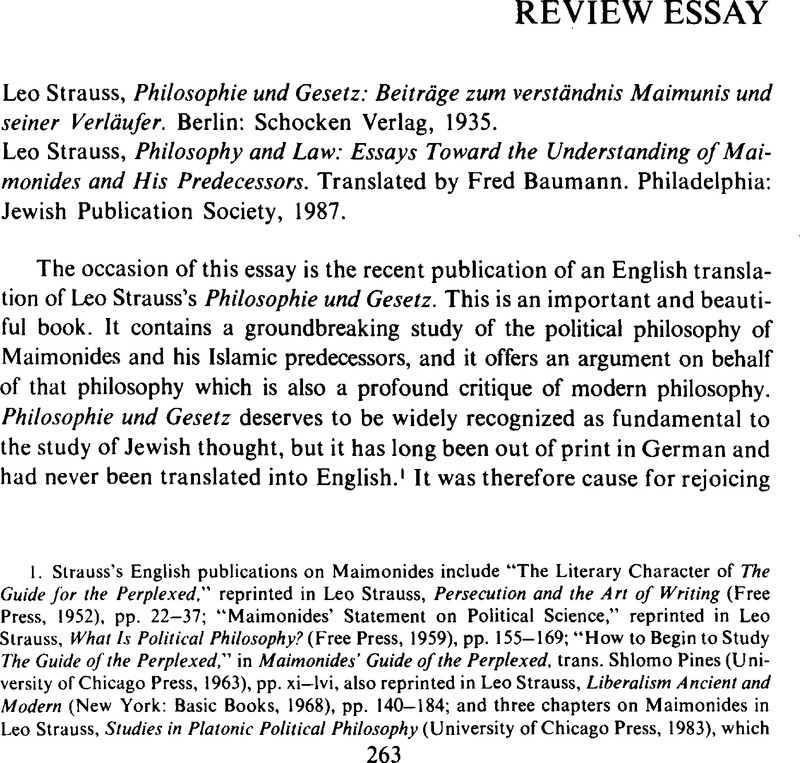Published online by Cambridge University Press: 15 October 2009

1. Strauss's, English publications on Maimonides include “The Literary Character of The Guide for the Perplexed,” reprinted in Strauss, Leo, Persecution and the Art of Writing (Free Press, 1952), pp. 22–37;Google Scholar“Maimonides' Statement on Political Science,” reprinted in Strauss, Leo, What Is Political Philosophy? (Free Press, 1959), pp. 155–169;Google Scholar“How to Begin to Study The Guide of the Perplexed,” in Maimonides' Guide of the Perplexed, trans. Pines, Shlomo (University of Chicago Press, 1963), pp. xi–lvi,Google Scholar also reprinted in Strauss, Leo, Liberalism Ancient and Modern (New York: Basic Books, 1968), pp. 140–184;Google Scholar and three chapters on Maimonides in Strauss, Leo, Studies in Platonic Political Philosophy (University of Chicago Press, 1983), which also contains a full bibliography of Strauss's works.Google Scholar
2. Strauss, Leo, Spinoza's Critique of Religion (New York: Schocken Books, 1965), pp. 1–31;Google Scholar reprinted as “Preface to Spinoza's Critique of Religion” in Strauss, Leo, Liberalism Ancient and Modern (New York: Basic Books, 1968), pp. 224–259. This essay will be cited as PSCR according to its pagination in the latter edition, where the sentence here quoted is on p. 256.Google Scholar
3. E.g., Baumann, pp. 10–11 and 13, vs. PSCR, pp. 254 and 256; Baumann, pp. 17–18, vs. PSCR, pp. 255–256.
4. “Dieser Teil der praktischen Philosophie (namlich die Politik) hat zum Gegenstand das Vorhandensein der Prophetie und die Angewiesenheit des Menschengeschlechts hinsichtlich seines Vorhandenseins, seines Bestands und seiner Fortpflanzung auf das religiose Gesetz.” Philosophie und Gesetz (hereafter cited as P&G), p. 111.
5. “… kann sie Gott nicht vom Kosmos her, als den Schopfer, sondern nur vom Bewusstsein her ‘entdecken’.” P&G, p. 36.
6. “Nur darum auch war der Versuch zeitweilig moglich, das moderne Ideal, das Ideal der Zivilisation, mittels der modernen Naturwissenschaft zu begriinden: man glaubte, der neue Naturbegriff sei das zulangliche Fundament fur das neue Ideal, daja der alte Naturbegriff das zulangliche Fundament des alten Ideals gewesen war. Aber man tauschte sich.” P&G, p. 23.
7. “… erkennt [Guttmann] die judische Tradition, und also eine unmoderne, vormoderne Instanz, als Richterin iiber das moderne Denken an.” P&G, p. 41.
8. “… die Modernen durch eine moderne Instanz, namlich durch ihre eigene historische Forschung, iiber die Gefahr eben dieses Verrats unzweideutig belehrt sind.” P&G, p. 43. Baumann omits the phrase “iiber die Gefahr eben dieses Verrats” from his version, which thus comes out: “the moderns are unambiguously instructed by a modern example, namely, their own historical research,” instead of “the moderns are unambiguously instructed by a modern tribunal, namely, their own historical research, about the danger of this very betrayaP” (p. 35).
9. “… durch ihn die Instanz bestimmt wird, die den Konflikt zwischen Vernunft und Offenbarung zu schlichten hat. Diese Instanz ist—fur einen Rationalisten selbstverstandlich—die Vernunft” (P&G, pp. 54–55). Baumann: “through it the instance is determined that must settle the conflict between reason and Revelation. This instance (self-evident for a rationalist) is reason” (p. 46).
10. Cf. also p. 46, “cases of truth” for “Wahrheitsinstanzen” (P&G, p. 54): “courts of truth, arbiters of truth.”
11. “Da diese Frage aber zentral ist, und da ausserdem der von Lewi angegebene Grund fur die grundsatzliche Moglichkeit ihrer Beantwortung der Sache nach die grundsatzliche Moglichkeit, alle Fragen zu beantworten, nach deren Beantwortung der Mensch ein natiirliches Verlangen hat, ausser Zweifel setzt, da andererseits Maimuni die Unzulanglicheit des menschlichen Verstandes ebenfalls allgemein behauptet, so muss gesagt werden: Lewi stellt der Insuffizienzbehauptung Maimunis die Suffizienzbehauptung entgegen.” P&G, p. 82.
12. “… sie wird nicht vom menschlichen Denken zugrunde gelegt, sondern sie ist zuvor dem menschlichen Denken auferlegt.” P&G, p. 47.
13. “…der Prophet ohne Pramissen und Konklusion, unmittelbar, theoretische Einsichten gewinnt.” P&G, p. 98, n. 2.
14. “… wird ihm das Problem der religiosen Wahrheit als das Problem des Verhaltnisses von theoretischem und religiosem Wahrheitsbewusstsein zum zentralen Problem der ‘Religionsphilosophie.’” P&G, p. 60.
15. “… verdient sie Guttmanns Darstellung zufolge die Kennzeichnung als rationalistisch.” P&G, p. 50.
16. “… er, der der Sache nach die judische Tradition als Richterin uber das moderne Denken anerkennt.” P&G, p. 60.
17. “… es zwischen beiden keinen Widerspruch geben kann.” P&G, p. 50.
18. Baumann here as elsewhere incautiously relies on David Silverman's translation (Guttmann, Julius, Philosophies of Judaism [New York: Schocken, 1973]) for passages from Guttman's Die Philosophie des Judentums quoted by Strauss in Philosophic und Gesetz. For instance, in the face of Strauss's emphatic warning that “an essential modification of the historical evidence results from the very use of the concept of ‘religion’” (“eine wesentliche Modifikation des geschichtlichen Tatbestandes allein mit der Verwendung des ‘Religions’-Begriffs … gegeben ist,” P&G, p. 58), Baumann reproduces Silverman's transformation of Guttmann's “Jewish premises of belief” (“der judischen Glaubensvorstellungen,” P&G, p. 32, n. 1) into “Jewish religious ideas” (Baumann, p. 115, n. 12).Google Scholar
19. “… der vorentscheidenden aristotelischen bzw. neuplatonischen Denkweise.” P&G, p. 43.
20. “gewahrt.” P&G, p. 101.
21. Especially misleading since the passage occurs in the midst of an account of the controversy between Maimonides and the Falasifa as to whether prophecy does or does not occur necessarily under given conditions, i.e., whether or not it is “guaranteed.”
22. “die Vorzeit.” P&G, p. 118.
23. “Naturrecht.” P&G, p. 20.
24. “Maimuni und die Falasifa den Vorrang der Prophetie vor der Philosophic behaupten.” P&G, p. 120.
25. “Dieses eigentliche Problem der Prophetie ist Gegenstand der Politik.” P&G, p. 58.
26. “urn vollkommen Mensch zu sein.” P&G, p. 89.
27. “ein schlechthin verbindliches Gesetz,” P&G, p. 117. Similarly Baumann makes “unconditionally political Zionism” (“den vorbehaltlos politischen Zionismus,” P&G, p. 28) into “unconditional political Zionism” (p. 19; tacitly corrected in Ralph Lerner's preface, p. xii); and “independent of all specifically philosophical deliberation” (“unabhangig von aller spezifisch philosophischen Dberlegung,” P&G, p. 68) into “independent of all specific philosophical deliberation” (p. 61).
28. “die der Philosophic transzendente Wahrheit.” P&G, p. 55.
29. “ubermenschlichen Machten.” P&G, p. 25.
30. “im Aufbau ihrer Welt.” P&G, p. 20.
31. “denn durch sie bestchen die Arten.” P&G, p. 114 n. 2.